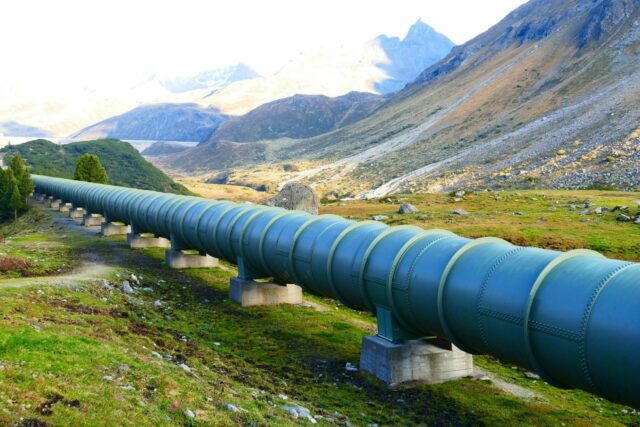
Azerbaijan Pivots to the Balkans
Publication: Eurasia Daily Monitor Volume: 20 Issue: 66
By:

On April 13, Azerbaijani President Ilham Aliyev paid an official visit to Sarajevo, Bosnia-Herzegovina. While there, Aliyev met with his counterparts, the members of the Bosnian tripartite presidency, Željka Cvijanović, Denis Bećirović and Željko Komšić (Azertac, April 13). Despite the shortness of the visit—Aliyev departed on the same day—it was considered quite successful as Azerbaijan gained “one more strategic partner in Europe” (Trend.az, April 13), with the leaders of the two countries signing a joint declaration on forming a strategic partnership between Azerbaijan and Bosnia-Herzegovina (Sarajevo Times, April 13).
Azerbaijani-Bosnian relations have intensified in recent years: Azerbaijan sent humanitarian aid to Bosnia during the pandemic (Report.az, April 13) and elevated its diplomatic mission in Sarajevo to an embassy in 2021. Moreover, the Azerbaijani side also invested in a medical center in Banja Luka, as well as a Friendship Park and medical institution in Sarajevo (Azertac, April 13). Cvijanović, chair of the presidency of Bosnia-Herzegovina, visited Baku in March 1 and met with Aliyev, during which both leaders hailed the high level of relations between the two countries (Azernews, March 1).
For its part, Sarajevo has also taken the initiative in bolstering relations with Baku. For example, Aliyev thanked Bosnia for its support during the Second Karabakh War in 2020 (Report.az, April 13). And as a result of those talks, Sarajevo decided to open an embassy in Baku (Trend.az, April 13).
With the expansion of bilateral ties, Aliyev’s visit to Bosnia-Herzegovina fits into a broader framework, with Azerbaijan increasingly pivoting toward the Balkans. Russia’s war against Ukraine has significantly upended Europe’s security architecture and increased the relevancy of alternative energy supply and transport routes between Asia and Europe. Thus, while Azerbaijan is not able to fully substitute for Russia at the pan-European level in terms of gas supply, it does and can play a crucial role in this regard for individual states, both in the European Union and in the EU`s direct neighborhood, by reducing dependence on Russian gas.
As the EU is interested in providing and maintaining stability and security on the continent, it attaches great importance to Azerbaijan’s involvement in the Balkans (and Italy). This importance was re-affirmed in October 2022 by the historic visit to Baku of European Commission President Ursula von der Leyen, who called Azerbaijan a game-changer in European energy security (Ec.europa.eu, October 1, 2022). Later, Von der Leyen also participated in the opening of the Gas Interconnector Greece-Bulgaria meant to deliver Azerbaijani natural gas directly to Bulgaria.
At present, Azerbaijan is working quite closely with Bulgaria and Greece in the Balkans: At the end of 2022, it was announced that the Trans Adriatic Pipeline (TAP) had safely transported over 18 billion cubic meters (bcm) of natural gas to Greece, Bulgaria and Italy since the start of commercial operations in 2020 (Apa.az, November 19, 2022). Bulgaria, which has a contract for 1 bcm of Azerbaijani gas, or one-third of the country’s annual needs, wants to increase that volume by up to 1 bcm more per year following the suspension of Russian gas flows to the country (Ekathimerini, September 30, 2022).
However, this is only scratching the surface as there is a huge potential for other projects, including the construction of the Gas Interconnector Romania-Serbia, which could also reduce regional dependence on Russia with the help of Azerbaijani gas. On several occasions, North Macedonia has expressed its interest in importing gas from Azerbaijani; however, this is largely dependent on the completion of the Greece–North Macedonia interconnector (Report.az, February 18, 2021; Fed.az, April 4). Moreover, the Ionian Adriatic Pipeline (IAP), which is currently under construction, will have the capability to transport Azerbaijani gas from Albania to Croatia via Montenegro and Bosnia-Herzegovina before delivering it to Central Europe, provided the necessary financial and political support is established (Balkan Insight, December 7, 2022).
While the recent strategic partnership declaration, as well as recent statements from the Azerbaijani and Bosnian leaders, stress the deepening of bilateral economic ties, including Azerbaijan’s investments in the Bosnian economy and Bosnia’s participation in the Middle Corridor, Aliyev’s visit also strengthened expectations about increased cooperation in the energy sector (Trend.az, April 16). As member of the Azerbaijani National Assembly Mushfig Mammadli pointed out, both sides agreed to expand “oil and gas cooperation,” especially in the area of green energy (Azertac, April 16). As such, Bosnia-Herzegovina is expected to receive 1 bcm from the IAP—whose output capacity is planned to be around 5 bcm—once the pipeline is completed, with the other expected beneficiaries being Albania (1 bcm), Montenegro (0.5 bcm) and Croatia (2.5 bcm) (Azerbaijan-news.az, November 19, 2022).
Thus, amid the current geopolitical developments in Eurasia, Azerbaijan has a historic chance to extend its influence in the Caucasus and Caspian Sea region both eastward (Central Asia) and westward (Balkans). Increased energy supply to Europe and further development of critical connectivity projects (Middle Corridor) will only serve to elevate Baku’s aspirations and opportunities. Having become a stakeholder in the Balkans with the establishment of the Southern Gas Corridor and its Balkan segment TAP, Azerbaijan is destined to play a more active role in the region and become a potential hub for transporting crucial energy resources into the Balkans and beyond.



